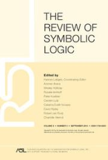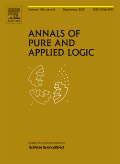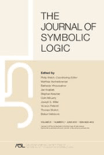
Review of Symbolic Logic
Scope & Guideline
Advancing the Frontiers of Logical Thought
Introduction
Aims and Scopes
- Formal Logic Systems:
The journal consistently publishes papers that delve into various formal logic systems, including modal logics, intuitionistic logics, and substructural logics, exploring their properties, completeness, and applications. - Philosophical Foundations of Logic:
There is a strong emphasis on the philosophical aspects of logic, including discussions on the implications of logical theories, the nature of truth, and the relationship between logic and epistemology. - Algebraic and Categorical Methods:
Many papers utilize algebraic semantics and category theory to analyze logical structures, providing a unique mathematical perspective on traditional logical problems. - Applications of Logic:
The journal covers a range of applications for logical theories, from computational logic to probabilistic reasoning, showcasing the relevance of symbolic logic in various fields. - Interdisciplinary Approaches:
The 'Review of Symbolic Logic' promotes interdisciplinary research that integrates logic with philosophy, mathematics, computer science, and cognitive sciences, highlighting the interconnectedness of these disciplines.
Trending and Emerging
- Non-Classical Logics:
There is a significant increase in research dedicated to various forms of non-classical logics, including paraconsistent and fuzzy logics, indicating a growing interest in exploring alternatives to traditional logical frameworks. - Computational Logic and AI:
Emerging themes in computational logic, particularly in relation to artificial intelligence and machine learning, are becoming more prominent, demonstrating the application of logical theories to modern computational challenges. - Modal Logic Innovations:
Recent publications show a surge in innovative approaches to modal logic, including new axiomatizations and applications, highlighting its relevance in philosophical and mathematical discussions. - Probabilistic Reasoning:
The exploration of probabilistic reasoning within logical frameworks is trending, reflecting a wider interest in how logic can model uncertainty and decision-making processes. - Interdisciplinary Research:
There is an increasing trend towards interdisciplinary studies that incorporate insights from cognitive science, linguistics, and computer science, showcasing the intersection of logic with other fields.
Declining or Waning
- Classical Logic:
There appears to be a decrease in publications focusing strictly on classical logic, as the journal shifts towards exploring non-classical and alternative logics that challenge traditional paradigms. - Historical Perspectives on Logic:
The frequency of papers examining historical developments in logic has declined, suggesting a move away from purely historical analyses towards more contemporary applications and theoretical advancements. - Basic Set Theory:
Topics centered on foundational aspects of set theory seem to be less prevalent, possibly indicating a shift towards more complex and applied theories rather than foundational discussions. - Elementary Proof Techniques:
There is a noticeable reduction in the number of papers that focus on elementary proof techniques and methods, as researchers increasingly favor more sophisticated and abstract approaches.
Similar Journals

Logical Methods in Computer Science
Fostering groundbreaking research in logical methodologies.Logical Methods in Computer Science is a premier Open Access journal dedicated to fostering scholarly dialogue within the realms of Computer Science and Theoretical Computer Science. Established in 2004 and published by LOGICAL METHODS COMPUTER SCIENCE E V in Germany, this journal aims to bridge theoretical frameworks and practical applications, providing a platform for innovative research and discoveries. With an impressive HIndex reflecting its commitment to high-quality research, Logical Methods in Computer Science has achieved a Q2 ranking in both the miscellaneous and theoretical categories of computer science, indicating its growing influence in the academic community. Researchers, professionals, and students are encouraged to access and engage with the wealth of knowledge this journal offers, which is freely accessible to facilitate widespread dissemination of cutting-edge advancements in logical methods. With its convergence period extending from 2005 to 2024, Logical Methods in Computer Science continues to be a vital resource for those looking to explore the intersections of logic, computation, and mathematics.

Reports on Mathematical Logic
Innovating Ideas at the Intersection of Logic and PhilosophyReports on Mathematical Logic is an esteemed academic journal published by Jagiellonian University’s Theoretical Computer Science Department in Poland. Focusing on the interdisciplinary realms of logic and philosophy, this journal publishes rigorous research articles that explore the foundational aspects and implications of mathematical logic in various contexts. Although it currently maintains an open access model, the journal's impact can be seen through its categorized rankings, with a Q4 in Logic and a commendable Q2 in Philosophy as of 2023. This positions it as a valuable resource for academics seeking to engage with innovative ideas and methodologies in the field. Additionally, the journal has a historical academic presence, having converged in its publication years from 2011 to 2014 and again from 2016 to 2023, underscoring its ongoing commitment to advancing knowledge in logic. With a focus on contemporary research, Reports on Mathematical Logic is essential for researchers, professionals, and students aiming to stay at the forefront of logic studies.

International Journal of Fuzzy Logic and Intelligent Systems
Unveiling the Future of Fuzzy Logic ApplicationsInternational Journal of Fuzzy Logic and Intelligent Systems, ISSN: 1598-2645, is a prestigious journal published by the Korean Institute of Intelligent Systems, dedicated to advancing the fields of Artificial Intelligence, Computational Theory and Mathematics, Computer Science Applications, Logic, and Signal Processing. Established to foster interdisciplinary research, this journal has quickly established its reputation, reaching a respectable Q3 quartile ranking across multiple categories in 2023. It serves as a vital resource for researchers, professionals, and students, offering insights into cutting-edge methodologies and innovative applications of fuzzy logic and intelligent systems. With a focus on disseminating high-quality research, the journal attracts contributions that drive the evolution of intelligent technologies and their practical implications. Published from South Korea, the journal is positioned to impact the global community, facilitating a deeper understanding of intelligent systems in various domains.

Studia Logica
Fostering Rigorous Exploration in Logic and PhilosophyStudia Logica is a leading international journal published by Springer that focuses on the intricate interconnections between logic, philosophy, and the history of science. Established in 1953, this journal has garnered an esteemed reputation, consistently appearing in the Q1 category for History and Philosophy of Science and Q2 for Logic in 2023. With a robust Scopus ranking, where it stands at #42 out of 223 in the field of Arts and Humanities and #17 out of 41 in Mathematics (Logic), Studia Logica is pivotal for researchers and scholars keen on exploring the foundations and implications of logical theory and its applications. The journal does not follow an open access model, ensuring that the published work maintains a high standard of quality and rigor. Located in Dordrecht, Netherlands, the journal continues to be a crucial conduit for advancing scholarly discourse and disseminating cutting-edge research in its respective fields.

JOURNAL OF PHILOSOPHICAL LOGIC
Fostering Innovative Dialogue in Philosophical LogicThe JOURNAL OF PHILOSOPHICAL LOGIC, published by Springer, is a prestigious scholarly journal specializing in the intricate intersections of logic, philosophy, and their diverse applications. Since its inception in 1972, this eminent journal has become a cornerstone of philosophical discourse, attracting leading researchers and scholars in the field. With an impressive ranking of #77 out of 806 in the Scopus Arts and Humanities - Philosophy category and being positioned in the top 10th percentile, it stands as a Q1 journal, denoting its significant impact and rigorous standards in academic publishing. Although not an Open Access journal, it offers access to a wealth of high-quality articles contributing to the advancement of logical theory and practice until 2024. The journal aims to foster a vibrant platform for the exploration and development of philosophical logic, encouraging groundbreaking research and innovative dialogue among professionals and students alike, and solidifying its role as an essential resource within the philosophical community.

ANNALS OF PURE AND APPLIED LOGIC
Advancing Knowledge in Pure and Applied LogicANNALS OF PURE AND APPLIED LOGIC is a premier academic journal published by Elsevier, specializing in the foundational aspects of logic since its inception in 1974. With a strong commitment to disseminating original research, the journal focuses on both pure and applied logic, making significant contributions to the fields of mathematics and computer science. The journal is recognized for its rigorous peer-review process and is currently ranked Q1 in Logic, reflecting its status among the top-tier publications in the discipline. Researchers will find valuable insights and advancements in logical theory and practice in its pages, while the journal's Scopus ranking further positions it strategically within the mathematical logic community. Although it is not an open-access publication, it offers convenient access options for institutions and subscribers, ensuring a wide reach for groundbreaking findings. The ANNALS OF PURE AND APPLIED LOGIC continues to be an essential resource for professionals, students, and academics alike, facilitating a deeper understanding of logical frameworks and their applications.

Logica Universalis
Bridging Theory and Practice in Mathematical LogicLogica Universalis is an esteemed academic journal published by SPRINGER BASEL AG, dedicated to advancing the fields of Applied Mathematics and Logic. With its ISSN 1661-8297 and E-ISSN 1661-8300, the journal has been active from 2007 and continues to contribute significantly to the discourse surrounding mathematical logic and its applications up to 2024. Located in Basel, Switzerland, Logica Universalis holds a notable position within the academic community, evidenced by its ranking within the Q4 category of both Applied Mathematics and Logic as of 2023. While it currently operates without Open Access options, the journal remains a pivotal resource for researchers and practitioners seeking to explore foundational and applied aspects of logic. Moreover, with a Scopus rank of #22/41 in Logic and #464/635 in Applied Mathematics, it provides a platform for comprehensive knowledge dissemination and facilitates innovative research that bridges theoretical and practical methodologies. This journal is instrumental for anyone looking to deepen their understanding and make meaningful contributions to these intertwined domains.

JOURNAL OF SYMBOLIC LOGIC
Exploring the Frontiers of Logic and PhilosophyThe JOURNAL OF SYMBOLIC LOGIC, published by Cambridge University Press, stands as a leading platform for scholarly discourse in the realms of logic and philosophy. With a rich history dating back to 1938, this esteemed journal is dedicated to presenting cutting-edge research that pushes the boundaries of knowledge within symbolic logic and its applications. In 2023, it proudly holds a distinguished Q1 ranking in both Logic and Philosophy categories, reflecting its high impact and relevance in the academic community. Researchers and academics benefit from its rigorous peer-review process and contributions from leading scholars worldwide, ensuring the dissemination of high-quality research and critical theories. While the journal currently does not operate under an open access model, it remains a pivotal resource for professionals seeking to deepen their understanding of logical theories and philosophical inquiries. Explore the JOURNAL OF SYMBOLIC LOGIC to engage with scholarly articles that challenge conventional thought and inspire future research.

JOURNAL OF AUTOMATED REASONING
Catalyzing Breakthroughs in Software and ReasoningJOURNAL OF AUTOMATED REASONING is a premier academic journal published by SPRINGER, focusing on the dynamic and evolving fields of Artificial Intelligence, Computational Theory and Mathematics, and Software. With an ISSN of 0168-7433 and E-ISSN 1573-0670, this journal ranks impressively in the second quartile (Q2) across multiple categories, reflecting its significant contribution to the advancement of knowledge in automated reasoning methodologies. Since its inception in 1985, it has served as a vital platform for researchers and professionals to share groundbreaking findings and innovative techniques, facilitating the exploration of algorithms, logical frameworks, and reasoning processes that underpin artificial intelligence systems. Although it does not currently offer Open Access options, it remains a highly regarded resource, cited widely in academia, with its impactful publications reflecting deep insights and rigorous scholarly standards. The journal’s esteemed status and its ongoing commitment to fostering a greater understanding of automated reasoning make it an invaluable asset for those dedicated to pushing the boundaries of these interdisciplinary fields.

Analisis Filosofico
Elevating voices in the realm of philosophy.Analisis Filosofico is a leading open-access journal published by SOC ARGENTINA ANALISIS FILOSOFICO, dedicated to advancing the field of philosophy. Since its inception in 2004, the journal has provided a platform for rigorous philosophical discourse and critical analysis, contributing significantly to the development of contemporary philosophical thought, particularly in the Latin American context. With an ISSN of 0326-1301 and an E-ISSN of 1851-9636, it has consistently maintained a robust presence in academic circles, as evidenced by its rank of #349 out of 806 in the Arts and Humanities Philosophy category on Scopus. The journal currently holds a commendable Q2 status in its category quartiles for 2023 and is positioned in the 56th percentile, reflecting its quality and influence among peers. Situated in Buenos Aires, Argentina, Analisis Filosofico engages with a diverse readership, encouraging scholars, professionals, and students to explore new theoretical perspectives and contribute original research. With ongoing topics converging from 2017 to 2024, this journal not only disseminates philosophical knowledge but also fosters innovative collaborations across the global scholarly community.